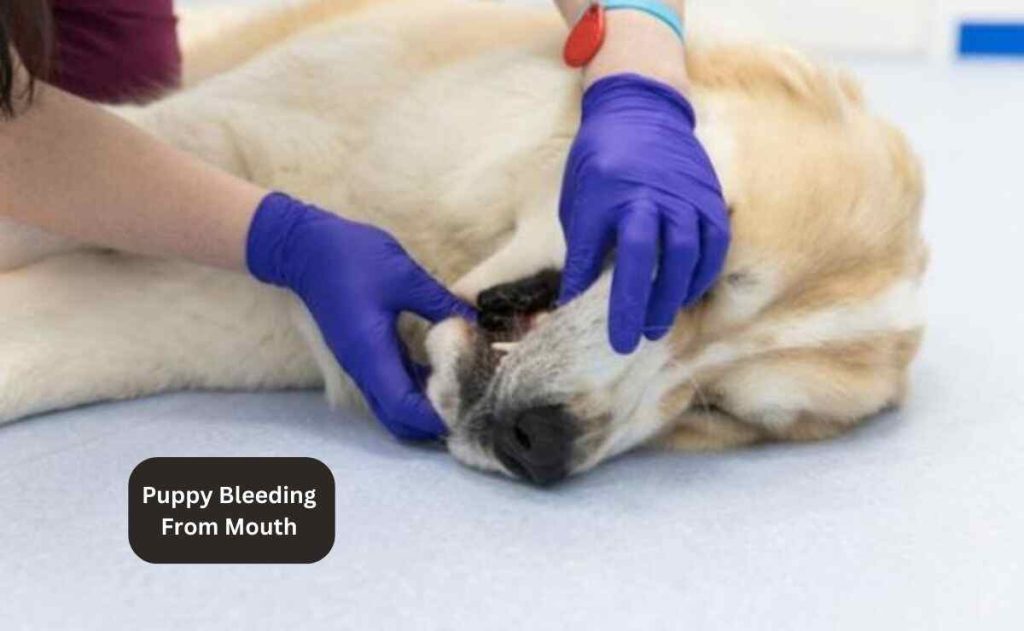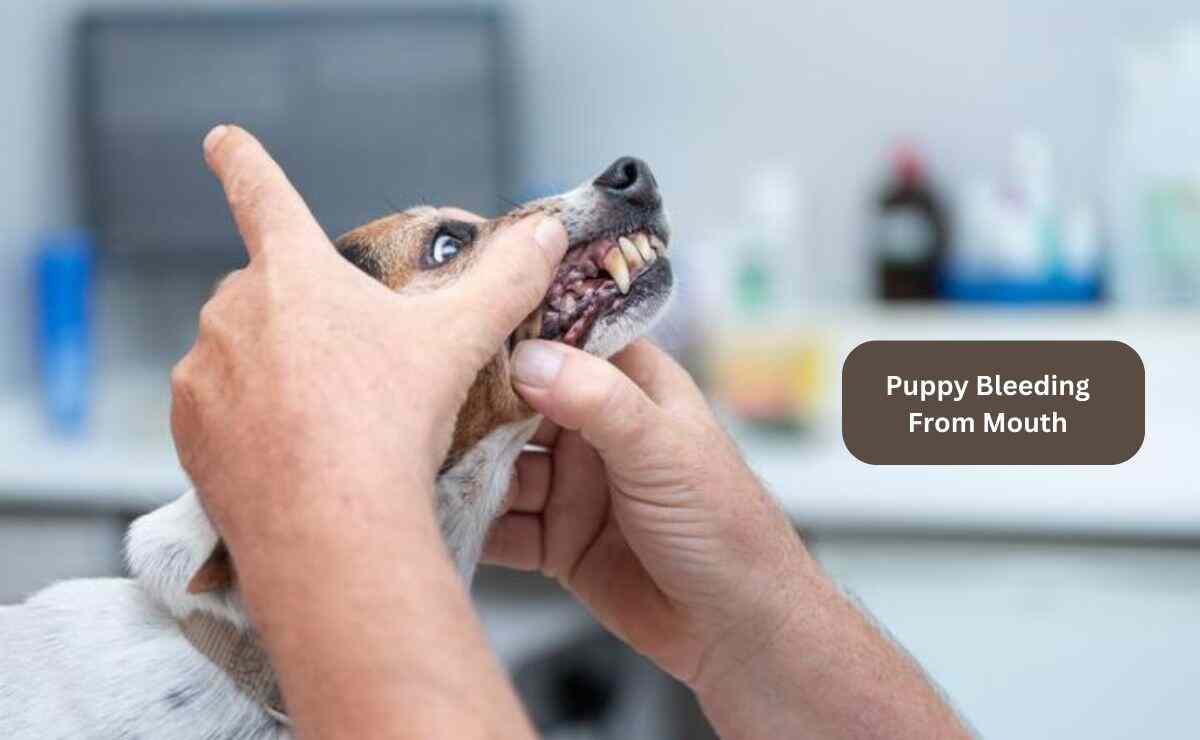It’s an alarming condition when a puppy is bleeding from its mouth. Well, a small amount of blood is not a big concern. But if they are constantly bleeding from their mouth, then you need to take immediate action.
Whenever you notice the situation, it’s necessary to find the real cause. Because excessive bleeding can cause severe situations for them. However, there are many reasons responsible for bleeding, and most times oral health problems are the major cause.
Why Does Puppy Bleeding From Mouth?

There are several potential causes for a puppy bleeding from its mouth, ranging from minor issues to more serious conditions.
1. Oral Lacerations
Due to oral lacerations, your puppy can bleed from its mouth. These are basically cuts or wounds inside your dog’s mouth. So, if you see more than just a few spots of blood on a toy, like actual dripping blood or really bloody drool.
Dogs are active and love to explore the world using their mouths. It’s not unusual for them to accidentally hurt themselves while chewing on toys or sharp objects. When this happens, they can end up with a cut inside their mouth, which can lead to quite a bit of bleeding.
The thing about the inside of the mouth is that it’s super sensitive, so even a small cut can make it bleed a lot. If you notice that your dog’s mouth seems to be dripping with blood or if the bleeding just won’t stop, it’s really important to act fast.
Don’t try to force your dog’s mouth open or mess with it too much, because that could make the bleeding worse. Instead, get your dog to the vet or an emergency clinic right away.
2. If Baby Teeth Fall Out
Sometimes, you can see a bit of blood on your puppy’s toy after they’ve been chewing on it. Don’t fret too much about it, especially if your puppy is around 3 to 4 months old. At this age, puppies have baby teeth that start falling out to make way for their grown-up teeth, just like kids lose their baby teeth.
This whole tooth-switcheroo usually begins when your pup is about 3 to 4 months old. The interesting part is that most puppy owners don’t even notice it happening. Often, a baby tooth will drop out, and your puppy swallows it or it could get lost somewhere in the house.
Now, when these baby teeth fall out, you can see a little bit of blood in their mouth. In most cases, there’s nothing to worry about, and don’t need to seek medical treatment. Your little buddy is probably just fine.
3. Gingivitis
Now, if your dog is a bit older around eight months or more, and you see that same chew toy or bone with a bit of blood, it is a more significant concern. Chewing can sometimes make their gums sore, especially if those gums are already affected by something called gingivitis.
Gingivitis is a common dental issue for dogs. It’s a sign of periodontal disease. Ideally, dog’s teeth should be brushed every day to keep their teeth healthy. But in reality, most pups aren’t getting their teeth brushed regularly.
So, as a result, plaque and calculus (which are like tiny, hard deposits) can build up on their teeth pretty fast. These plaque and calculus things have bacteria that can cause infections and make the inside of their mouths swollen and sore.
So, if you notice your dog’s gums looking red and bleeding a bit, especially when they’re not munching on anything, it’s a good idea to set up a regular checkup with your vet or a pet dentist.
4. Foreign Materials
Sometimes dogs, especially retrievers, love to carry sticks in their mouths and run around. While this is a fun game, it can also pose a risk. Sometimes a piece of that stick or some other object can poke into your dog’s mouth and get stuck there. It can make their mouth bleed, maybe internally.
When something is stuck in a dog’s mouth, their owner might not even know it for weeks or even months. If you suspect your dog might have something stuck in their mouth, do not try to remove it yourself. It’s not safe, and it could make things worse.
The best thing to do is to take your dog to the vet. They’ll be able to check things out properly and remove the object safely.
5. Tooth Luxation
Sometimes, a dog’s mouth can start bleeding because tooth luxation. This happens when a tooth, often one of those sharp fang-like ones, gets out of its normal place. It can happen if a dog gets their tooth stuck on something like a fence, during a rough doggy playtime, or even just while having fun with a dog buddy.
Now, when a tooth gets out of place, it can cause some bleeding. It’s usually pretty messy because it can tear the gums when it happens. So, if you notice a tooth pointing in a weird direction, this is definitely a reason to rush to the vet.
The good news is that there are ways to treat a luxated tooth. Sometimes, the vet can carefully put the tooth back where it should be and use a special splint to keep it in place. Most of the time, a root canal is needed to save the tooth.
If splinting and a root canal aren’t possible or affordable, it’s okay. Sometimes, the best option is to remove the tooth. What matters most is that your dog doesn’t feel pain and can still use their mouth properly.
6. Oral Tumors
Oral tumors also can be the cause of bleeding in mouth. These are not what anyone wants to deal with, but it’s important to know about them. The three most common types of oral tumors in dogs are oral melanoma, squamous cell carcinoma, and fibrosarcoma. They sound scary, and they can be.
Sometimes, you can notice something strange on the outside of your dog’s mouth, like swelling. But other times, these tumors hide inside the mouth, making them hard to spot in your day-to-day interactions with your puppy.
In these cases, the first signs can be blood or slightly bloody spit from the mouth, especially on one side. Your dog might also have trouble eating, lose their appetite, or have really bad breath.
If you see any of these signs, don’t wait—schedule an appointment with your vet so they can take a closer look inside your dog’s mouth. They might need to sedate your pet to get a good look.
What To Do If Your Puppy Is Bleeding From The Mouth?
Just like humans, puppies can develop dental issues such as gum inflammation, tooth decay, or oral infections. These conditions can lead to bleeding and discomfort. Providing appropriate chew toys and brushing your puppy’s teeth regularly can help prevent dental problems.
However, if your puppy is already experiencing bleeding from the mouth, it is essential to have a veterinary professional assess the situation and provide appropriate treatment.
In some instances, bleeding from the mouth can indicate a more serious problem. Blood disorders, liver or kidney disease, or even certain types of cancers can lead to bleeding in the mouth. If your puppy has other symptoms such as weakness, decreased appetite, or weight loss, it is crucial to seek veterinary attention immediately.
To determine the exact cause of your puppy’s bleeding from the mouth, a veterinarian will do a thorough examination like a physical examination, blood tests, dental X-rays, or other diagnostic procedures as needed. When the vet identifies the actual problem, he/she will proceed to medication, dental procedures, or further testing.
Conclusion
If you notice your puppy bleeding from its mouth, it is essential to seek veterinary care.
There may be various causes for this symptom, and only a qualified veterinarian can provide an accurate diagnosis and recommend appropriate treatment.
